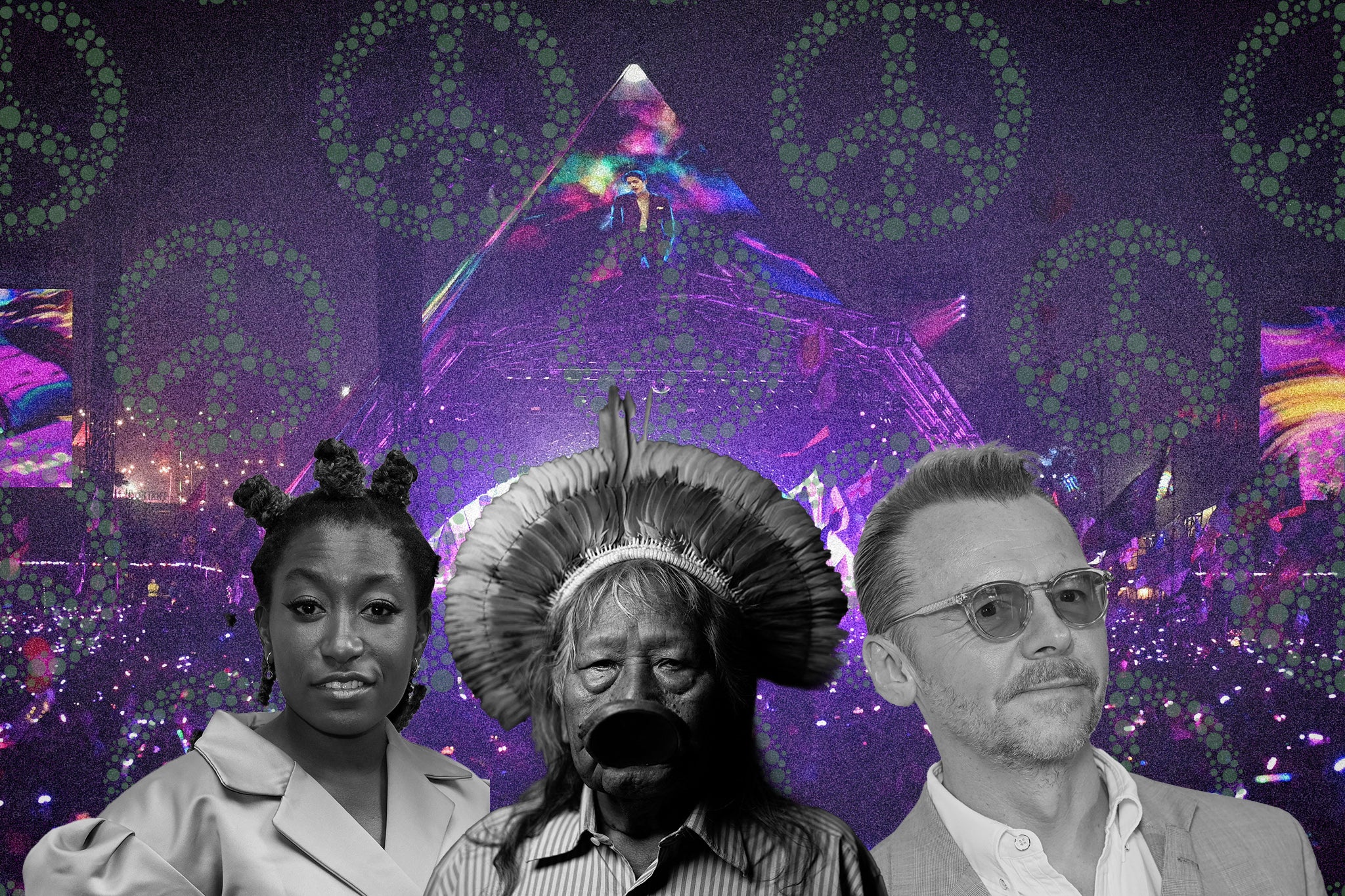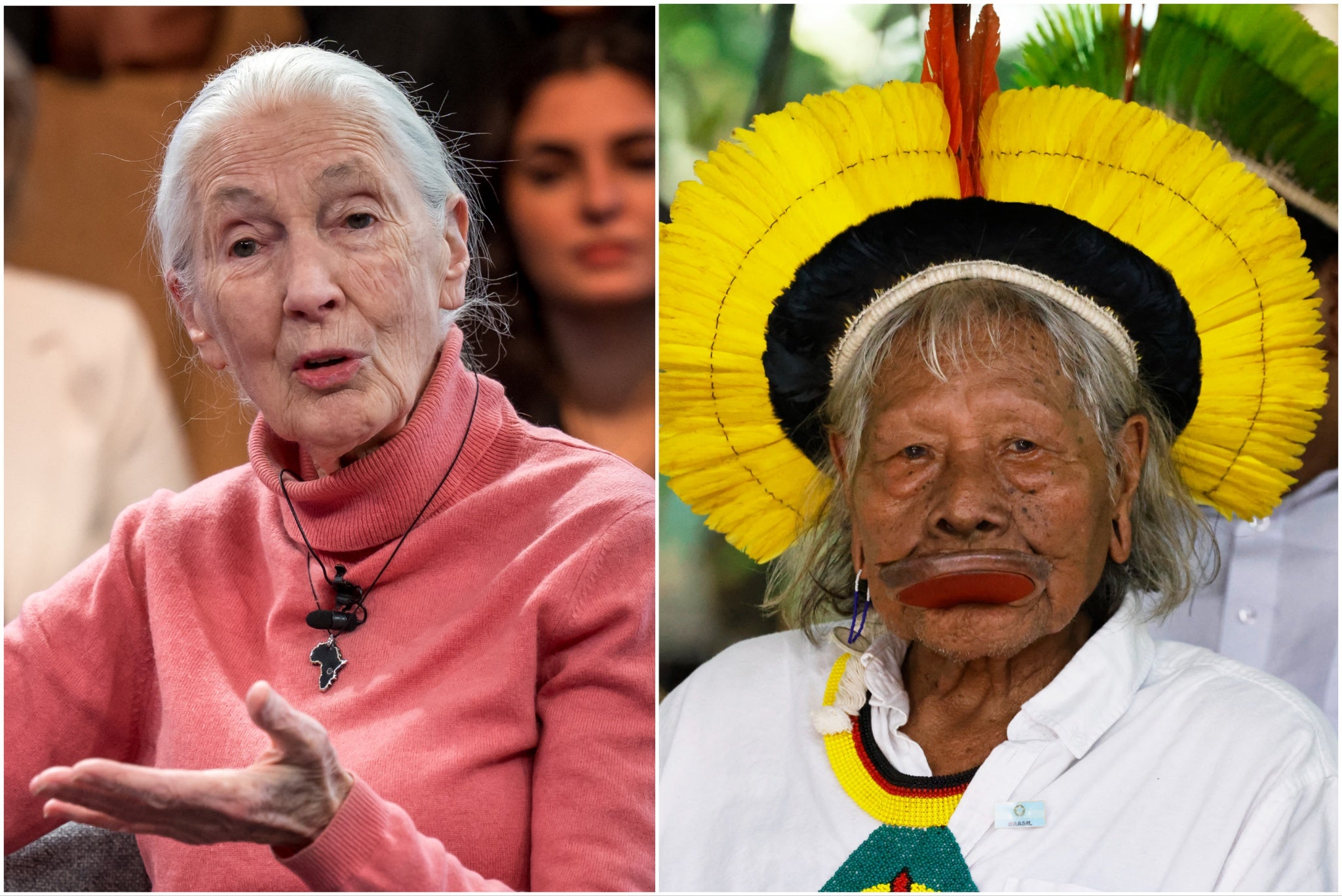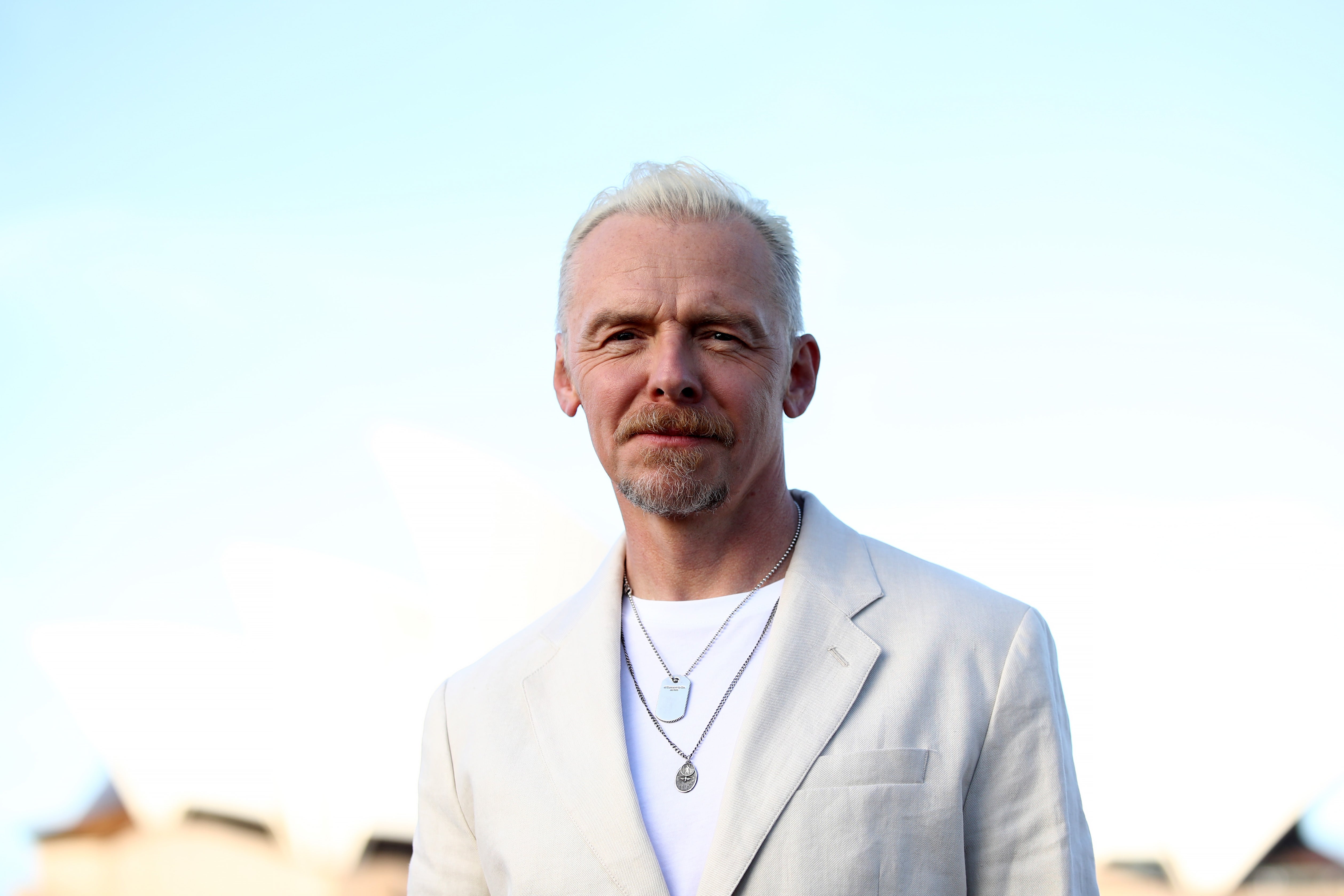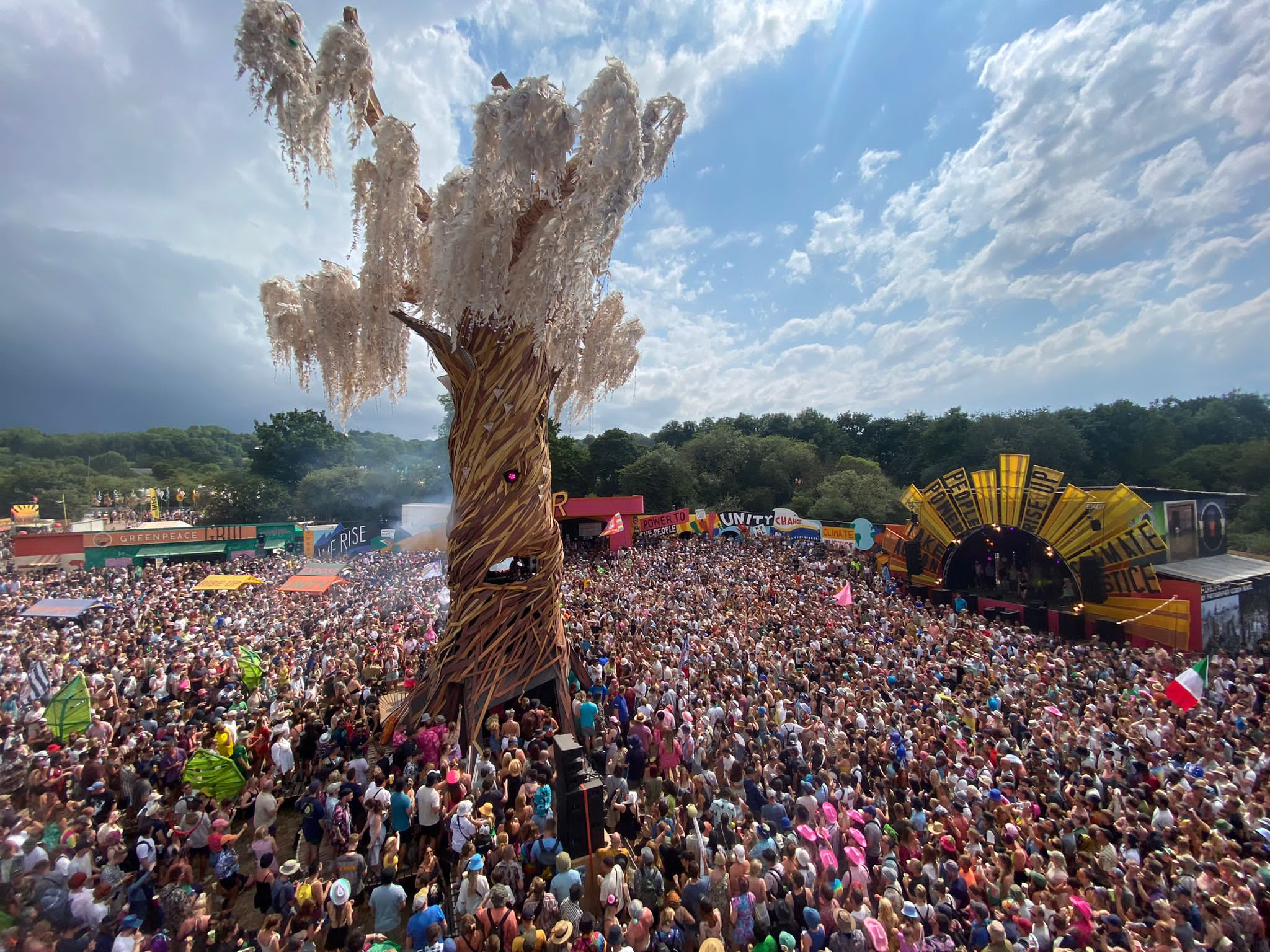‘We’ve got to keep fighting’: Simon Pegg, Sophie Duker and Greenpeace on Glastonbury’s climate activism
As the general election looms, activists are campaigning harder than ever to get MPs to wake up to the climate crisis. Mark Beaumont reports from the Greenpeace Field at Glastonbury

Your support helps us to tell the story
From reproductive rights to climate change to Big Tech, The Independent is on the ground when the story is developing. Whether it's investigating the financials of Elon Musk's pro-Trump PAC or producing our latest documentary, 'The A Word', which shines a light on the American women fighting for reproductive rights, we know how important it is to parse out the facts from the messaging.
At such a critical moment in US history, we need reporters on the ground. Your donation allows us to keep sending journalists to speak to both sides of the story.
The Independent is trusted by Americans across the entire political spectrum. And unlike many other quality news outlets, we choose not to lock Americans out of our reporting and analysis with paywalls. We believe quality journalism should be available to everyone, paid for by those who can afford it.
Your support makes all the difference.Five days to save the planet? Perhaps not, but glancing around at the Vote for Climate slogans emblazoned across the Greenpeace Field from Terror Slide to Rave Tree is a wake-up call that 4 July might prove a make-or-break point in the fight against environmental devastation.
“This election is going to be a fairly defining one for the climate,” says Greenpeace co-executive director Will McCallum, sat in the shadow of the gigantic tree-cum-DJ booth that symbolises this party’n’politics heart of Glastonbury Festival.
“This government is going to oversee most of the transition, or not. And what we’re seeing is that none of the major parties are really prioritising climate.”
Even before the election was called, the activists who bring this vital and wonderful space to life each year were engaged in a 2024 campaign called Project Climate Vote, intended to alert the major parties to rising public concern.
“It’s very clear that, at a leadership level, it’s not one of the things they think people care about when they’re voting,” McCallum argues. “So this was a campaign to get people to vocalise what they say in the polls on the doorstep: to actually say, ‘The climate is something that I think about when I’m voting.’” It also aims to combat voter apathy on this long-fuse topic: “We wanted to use this field as a chance to say to people, ‘Next week is one of those major chances where you can make a difference.’”
The message, as ever, comes wrapped in one of the most enjoyably inventive, eclectic and unmissable schedules on site. At any time of the day or night you might stumble on a Confidence Man takeover, a Frank Turner secret set, or, as on Friday, a legendary meeting between iconic activist and primatologist Dr Jane Goodall and Indigenous Brazilian environmentalist Chief Raoni.

“It was very, very special,” McCallum grins. “Particularly because Greenpeace had actually, earlier this year, taken both of them separately over the Amazon to look at the illegal gold mining, and so they came together and talked about their experiences with us.”
On Saturday afternoon, we catch comedian Sophie Duker hosting an improvised comedy challenge contest called Miss (Burning) World, involving Ivo Graham and Olga Koch making each other outfits from recycled toilet paper, and, at one point, Graham interrupting proceedings to point out this writer in the crowd and effuse about my frontline role in the vicious Interpol versus Editors debate that tore apart the pages of NME in 2006.
“Obviously, we are in times which are quite bleak for various reasons to do with climate, but also have to deal with the world as it is under capitalism, with wars and genocides,” Duker – a Glastonbury virgin keen to hunt out the Green Fields’ mythical nudist sauna – says backstage.
Enjoy unlimited access to 100 million ad-free songs and podcasts with Amazon Music
Sign up now for a 4 month free trial (3 months for non-Prime members)
Enjoy unlimited access to 100 million ad-free songs and podcasts with Amazon Music
Sign up now for a 4 month free trial (3 months for non-Prime members)
“But I think that having a moment of silliness opening this Saturday, and seeing people in a different, unrehearsed, unprepared context, it was a high-concept, ambitious experiment. To take us out of the stresses that we might have, and be a bit camp and silly on stage, under budget. This field is an amazing place to be, and it’s interesting seeing how you can contribute with your own quite weird skill set to a general ambience of joy.”

The Greenpeace Field is increasingly a place for big onsite names to gather to chill, discuss issues, and conscientiously rave. “It’s nothing but hippies here. The best people in the world,” says regular Simon Pegg, holed up in the tree trunk colosseum The Hive and throwing himself into the election debate.
“Our choices have become so narrowed,” he argues. “I’m a lifelong Labour voter. There are certain things about Labour that I’m not that keen on, but if anything, I just want the Tories out. There are things that I would hope, once Labour get into power, that they can be swayed on, or perhaps rethink certain things. But we’re in a better position if they’re in power than we are if the Tories are, because we’ve had such a long period of chaos, and exploitation, and self-serving boneheaded politics.”
The rise of Reform UK in the polls has the terrifying knock-on effect of popularising Nigel Farage’s disastrous idea to scrap all net-zero ambitions in order to fund his immigrants-out agenda. Might such thinking be dangerous if it takes hold?
“This happens in times like this, populist thinking, because it’s very much a gut reaction. It’s all about very broad adversaries and simple solutions,” Pegg says. “But I hope that the majority of people see him for what he is. He’s a sinister character, and his ideas are anti-human. I would hope that most people see sense, but I don’t blame anyone for being fooled by it. Sometimes, when you’re desperate, you just want to hear what you want to hear.”

McCallum finds hope in the gradual rise of the Greens. “They are aiming for four seats this election,” he says, “but I think, everywhere, what we’re seeing is people are actually keen to talk about what parties want to do about climate change. The Green Party feel able to answer those questions, the Lib Dems feel able to answer those questions. Why aren’t we seeing it from the two major parties?”
He’s particularly frustrated by watching entirely reasonable questions on climate issues batted away during televised leaders’ debates: “I saw the prime minister answer by saying, ‘Green will raise your bills.’ That is the only answer that they have, and that is deeply depressing.”
McCallum refuses to be ground down by the political sidelining of the climate crisis, however. “We’re never hopeless. We’re very much in the business of summoning hope, because that’s the only way we will see change happen...
“People understand that climate change is happening. They understand because their town has flooded, they understand because there’s been a heatwave, or because they’ve got relatives living in other countries where there are far more severe climate impacts. But what they don’t realise is that, if politicians don’t do something about it, this isn’t going to change – it’s only going to get worse.”

“I always vote Green because I live in Brighton and we get Green,” says Orbital’s Paul Hartnoll, hanging out in The Hive ahead of his Park Stage show and discussing ways to lessen his carbon impact, from heat pumps to solar panels and electric cars. “I hear that Bristol might be going Green as well. If we get two or three Green voices in parliament, you want those voices needling away all the time.”
Glastonbury 2024 is perhaps the most high-profile advert for sustainability the planet has ever seen. From its vast recycling plant to booking the most carbon-neutral stadium act in the world in Coldplay, it’s leading the way in tackling the ethical dilemmas of a private-jet-addicted music industry.
“The most exciting thing, given the campaign against Barclays at all of the other festivals around the country, is to come to a festival that does not take corporate sponsorship in that way,” says McCallum. “Where there aren’t these big fossil-fuel giants, there aren’t the big banks, you’re not walking around absorbing advertising. That’s what makes Glastonbury special.”

How could other festivals follow suit? “They can have more campaigning on site. People think of festivals as escapism, they think of it as leaving behind the world out there to come and just have a hedonistic time. But actually, so many people come here to be restored, to be inspired, to feel hopeful. And I think the more festivals can see that message all around the site, and invite groups like us on to talk about these things, the more hopeful and inspired people feel when they leave the site. Then they can go on to more activism, or to better choices.”
And if 4 July, as widely expected, doesn’t usher in a new era of vastly accelerated climate action in Downing Street, the grassroots battle continues.
“We can’t let ourselves feel hopeless,” says Pegg. “The trouble is that the effects of climate change impact places that are of little economic value to the powers that be. But we have to keep at it, because the moment we give up, that’s it.
“There is a genuine desire out there to survive. Surely we must all, somewhere, feel the desire to kick back against anything which is jeopardising our future. We’ve just got to keep fighting.”
Join our commenting forum
Join thought-provoking conversations, follow other Independent readers and see their replies
Comments